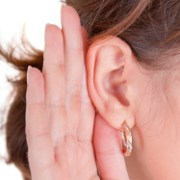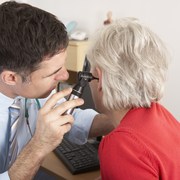 Photo: Getty Images
Photo: Getty Images
According to the National Institute on Deafness and Other Communication Disorders (NIDCD), more than 36 million American adults experience some form of hearing loss and women are less likely to experience hearing loss than men.
Also, there seems to be a correlation between hearing loss and age. For example, the NICDC stated:
• One in three people older than 60 have hearing loss
• 18 percent of American adults 45-64 years old do as well
• 30 percent of adults 65-74 years old have hearing loss
An ear, nose and throat (ENT) doctor, also known as an otolaryngologist, will diagnose the cause of your hearing loss and recommend possible treatment options.
There are two phases to check for hearing loss. The first phase is a hearing screening with an audiometer and the second is a hearing evaluation. The ENT may recommend an audiologist to test and measure your hearing. A screening is the first test to see if a second test, a hearing evaluation, is necessary. Also, if a hearing aid is necessary, an audiologist can fine tune it for your condition.
The hearing evaluation may include a tympanogram and an acoustic reflex test.
The tympanogram measures the pressure and volume in the middle ear. A small device is placed inside the ear which changes the pressure in the ear. The test may be temporarily uncomfortable because of the pressure and noise it creates. This pressure makes the eardrum vibrate. The vibrations are recorded and used to diagnose your hearing condition.
Also, the acoustic reflex test checks for the location of a hearing issue. A small instrument is placed in your ear and emits a loud sound. As the sound is released in the middle ear, the small muscle in the ear contracts. The measurement of the sound, or lack of measurement, is the information used to diagnose your hearing condition.
At any age, you can have your hearing checked. NIDCD http://www.nidcd.nih.gov/health/hearing/older.html#older_01 and the American Speech-Language-Hearing Association http://www.asha.org/public/hearing/Self-Test-for-Hearing-Loss/ both offer a free online questionnaire to test for possible hearing loss.
Some of the questions include:
• Do you find yourself asking people to repeat themselves?
• Do people I talk to seem to mumble?
• Do you have to strain to understand a conversation?
• Is the volume high on my telephone, television or radio?
• Are my ears ringing?
See the above websites to take the complete hearing loss tests.
If you feel you or someone you love has a hearing problem, contact your medical practitioner.
Sources:
http://www.asha.org/public/hearing/Hearing-Testing/
http://www.nidcd.nih.gov/health/hearing/older.html#older_06
http://www.nidcd.nih.gov/health/statistics/quick.htm




Add a CommentComments
There are no comments yet. Be the first one and get the conversation started!